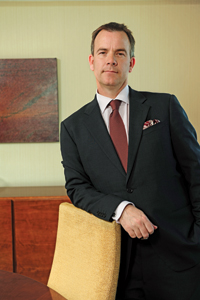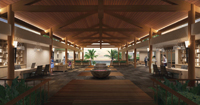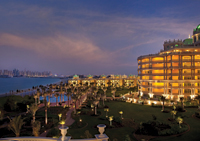
Luxury brand Kempinski is committed to innovation and giving its guests the very best service as it expands across the region
AS high-end hotel group Kempinski prepares to launch new hotels across the Middle East, Luxury by TTN speaks to chief operating officer Duncan O’Rourke about what constitutes luxury and the company’s future plans.
What is your definition of luxury and what makes Kempinski different from other luxury groups?
Luxury certainly means different things to different people. To me, it means being part of a select group of people that has access to a variety of exclusive services or products. The delivery of the service and the quality of the product go hand in hand in the luxury business. This also applies to the hospitality industry – there must be a perfect balance between the service provided and the product. We believe that providing our people with the right tools to offer a superior level of service in an exquisite property makes us different as a hotel group.
 |
|
O’Rourke |
How do you plan to continue the brand’s development within the luxury market in the face of so many new products, all aiming for the high end?
Kempinski will continue to search for innovation in hospitality. Even as a well-established luxury brand, we are aware that the brand must continue to evolve in order to survive. We aim to provide our guests with moments that will never be forgotten, with experiences that will be cherished forever.
How did you become involved in the luxury hotel sector?
I always knew that I wanted to do something different, not follow the same line of business as the rest of my family. When I began learning about the luxury hospitality industry, I knew it was what I wanted to do.
I understand you were previously in Jordan – do you feel the Middle Eastern take on luxury is different to that in other parts of the world?
Absolutely. Each culture has a different approach to luxury and, in this aspect, the Middle East is very unique. Understanding this approach includes knowing what guests will expect from a luxury service provider in that region – in our case, European luxury on a grander scale, at the same time respecting the local culture and customs, not only for the sake of domestic travellers but for guests coming from overseas, who want to discover the destination using the hotel as a springboard.
In Europe, for example, that is completely different; because of the global economic downturn, looking wealthy is not so much in vogue anymore. Wealth is something that should only be discreet, out of respect for the current situation as well as to maintain an aura of exclusivity.
 |
|
Seychelles Kempinski Resort will open in October |
How was 2010 for the group compared to 2009?
It was a better year, as the effects from the global economic downturn began to fade and we saw business travel start to pick up again as our hotels in Europe continuously improved their performance.
How is 2011 developing so far, has the unrest had a significant effect and what are forward bookings across the region looking like towards the end of the year?
2011 has so far shown further improvements and we remain optimistic. Occupancy in the Middle East will be somewhat dependent on the political situation of certain countries but, for now, the region is performing well, even in these circumstances. In situations like these, there is generally a temporary decrease in travel. Overall, we have seen a slight decrease in occupancy in the region but our hotels in Egypt are bouncing back after a period of social unrest in their country and our hotels in the UAE are also performing very well.
How many properties does Kempinski have in total and how many in the Middle East and Africa?
We currently manage 65 properties, of which 15 are in the Middle East and in Africa.
Are there plans for expansion and where will this be?
This year sees four scheduled openings in the Middle East and Africa region. The Kempinski Hotel & Residences Palm Jumeirah is the group’s first beach property in Dubai, UAE, and is a five-star all-suite hotel with accommodations comprising between one and five bedrooms.
 |
|
The Kempinski Hotel & Residences Palm Jumeirah is a five-star all-suite property |
Kempinski will also add another region to its list of beautiful destinations with the Seychelles Kempinski Resort at Baie Lazare on the island of Mahé. This will add value to Kempinski’s portfolio when it opens to this exclusive market in October.
A major project in Namibia sees the acquisition of the Midgard Country Estate, which is following the takeover of Kempinski Mokhuti Lodge in 2008, in addition to the Kempinski Hotel Bahrain which is scheduled to open in September 2011.
In 2012, the Kempinski Al Othman Hotel in Al Khobar – a city located in Saudi Arabia’s oil-rich Eastern Province – will open for business guests, to be joined during the course of the year by two more properties in the kingdom, the Kempinski Hotel, Burj Rafal in Riyadh and the Kempinski Hotel, Jeddah.
The Summerland Kempinski in Beirut, Lebanon and the Kempinski Residences in Alabadiyah Hills, also in Beirut, will also open during 2012.
 |
Scheduled for opening in 2013 are the Kempinski Hotel The Wave in Muscat, marking the group’s entry into Oman, and a second hotel in Egypt’s capital Cairo, the Kempinski Hotel, Royal Maxim, which will join the Kempinski Nile Hotel. The opening of the Kempinski Hotel in Accra, Ghana, in 2013 will further strengthen Kempinski’s profile in Africa.
How do you see the luxury sector developing, how will it continue to differentiate itself from the regular five-star?
In terms of hospitality, luxury service will continue to develop up to the level of entirely personalised hotel stays. Any company can build a five-star hotel but the service and product, which can itself be adapted to individual guests, that the hotel will provide will define its standing in the luxury business.
Is the luxury sector becoming more attainable as larger numbers in developing countries have access to greater disposable income and how should the sector react to this in terms of keeping its exclusivity?
Luxury is not something that can be mass-produced. Innovation is something that is ingrained in the luxury business because trend-setting plays an extremely important role. It is all about finding new ways to become desirable and only attainable to a lucky few.
